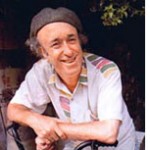By Dan Bloom

CHIAYI CITY, Taiwan — Take a female newspaper reporter in Manhattan named Rebekah Roberts covering a murder in the Hasidic community — where a recent murder has everyone talking — and you’ve got a very good and probing debut novel by CBSNews.com reporter Julia Dahl.
Released in May,, Invisible City is a book for our times. Jewish readers, especially, might find the novel enlightening due to its theme of covering a murder in a closed community like the Hasidim. Yes, the book is a murder mystery.
Dahl, like the main character in her novel, is the daughter of a marriage between a Jewish mother and a Christian father, and she brings her own insights to the storytelling as well. She says she started writing Invisible City after being hired as reporter for the New York Post in 2007.
When her editor sent her to cover a suicide of a young Hasidic man who killed himself right after his wedding, the outlines of a novel that would explore the mysterious world of the Hasidim began to take shape in Dahl’s mind.
The plot is pure fiction — Dahl made it all up as part of her writing process — but it’s based on a real world, too, and that’s where readers will find the novel about an insular ultra-Orthodox community intriguing.
I sat down with the author recently for an email exchange, and she was kind enough to answer my questions. When asked what the reactions have been from Orthodox readers, she said that main criticism she has received from the Orthodox and Haredi community is that they said “in real life” the murder victim’s body would have been autopsied, and Dahls’ novel, it isn’t.
“Since the book is fiction I took some license,” Dahl told the San Diego Jewish World. “Is it possible a powerful family could discourage an autopsy? I think so.
“One Conservative Jewish man I know and respect told me he thought the book vilified the Orthodox community, which was hard to hear because it wasn’t my intention, and I thought I’d done a good job of providing a balanced look at that world. So far, Reform Jews I know have embraced the book. I’ve even been invited to speak at a synagogue.”
The question many readers want to know is: Will there be a sequel?
Dahl said yes, noting: “I started writing fiction around the same time I started writing for newspapers, which was my senior year in high school. The two endeavors exercise different muscles [in the brain] and allow me to explore different things, so I love that I’m lucky enough to do them both. The next Rebekah Roberts novel will be out in 2015.”
My last question: Did Dahl’s own background figure into the writing of the novel and did it help her to write about the Rebekah Roberts character she created for this book and the sequel?
“My mother is a Reform Jew and my father is a deacon in the Lutheran church,” she explained. “Neither converted, and both are very devoted to their respective religions. They’ve been married for 42 years and are very happy — they see more similarities than differences in their faiths. This dual-religious identity is, in many ways, the story of my life, but I’ve never really explored it in my writing before creating the Rebekah character. Her background is very different from mine — and more traumatic — but I got to work out some of the feelings I have about both religions with this book.”
*
Bloom is Taiwan bureau chief for San Diego Jewish World as well as an inveterate web surfer. He may be contacted via dan.bloom@sdjewishworld.com